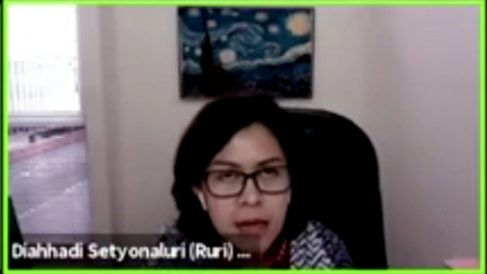LD FEB UI Researcher: Marginal Groups Need More Attention During the Pandemic
DEPOK – (11/15/2020)
The poor of society increased during the Covid-19 pandemic, but the government provided various forms of assistance targeting all groups of society.
During the Covid-19 pandemic, three marginalized groups were classified as vulnerable. They are groups of the poor, poor women, and the disabled.
“Even before Covid-19, these groups already experienced obstacles for access to public services, economic opportunities, and were prone to social inequalities.” said Universitas Indonesia (UI) Demographic Institute researcher, Diahhadi Setyonaluri, in the Focus Group Discussion (FGD) of Marginal Groups in Pandemic Traps. Covid-19, with Media Indonesia, yesterday.
In the FGD, which took the sub-theme of Empowerment of marginalized groups during the pandemic: the perspective of policy makers in Java Island, he said that women still experienced gender bias in the public sphere, namely in the economic sector, wages are still unequal so that many women chose the informal sector for income.
“Traditional gender norms are still causing the division of roles in the household to still be only the duty of mothers,” he said.
In addition, Diahhadi continued, there is still a threat of domestic violence (KDRT), which often impacts women. According to him, the Covid-19 period caused a triple burden. After the PSBB was established, women still had to carry out domestic duties, but they also had to work formally.
“The results of the analysis using national labor force survey data show that many women take public transportation when compared to men. Female workers are also vulnerable because 72% work in hospitality without a contract,” he added.
The Disabled group
Furthermore, Diahhadi said, there is inequality in accessing health services for the disabled due to various reasons. “Among other things because of infrastructure. They depend on family members who could currently be affected by Covid-19. That certainly disrupted their welfare,” he said.
In addition, school-age disabled also find it difficult to learn from home, especially those with mental disabilities. On the same occasion, Acting Secretary of the West Java Province Social Service, Adang Surahim, said that the poor did increase during the Covid-19 pandemic. From the previous 3.38 million to 3.92 million. However, he made sure that the government provided various forms of assistance targeting all groups of society.
“There are nine gateways for social assistance initiated by the government, namely the family hope program (PKH) card, the BPNT basic food program, the presidential food assistance, village funds, the pre-employment cards, cash assistance from the Ministry of Social Affairs, social assistance from West Java Province, social assistance from districts / cities, and the packaged rice movement through community self-help,” he explained.
Secretary of the Central Java Province Social Service, Rina Irawanti, added that her organization has spent a budget of Rp. 1.3 trillion for social assistance programs.
“There are three programs. First, the social safety net implemented by the Social Service of Central Java Province, then the Economic Safety Net implemented by all relevant stakeholders, and Jogo Tonggo which is carried out entirely by the community. ” explained Rina.
“Indeed, this program is not specifically intended for marginalized groups, but as part of the greater society, marginalized groups are included in these activities. So all programs reach all community groups in Central Java, ” she said.
Source: Media Indonesia Newspaper. Edition: Sunday, 15 November 2020. Rubric Selekta. Page 2.
(am)



